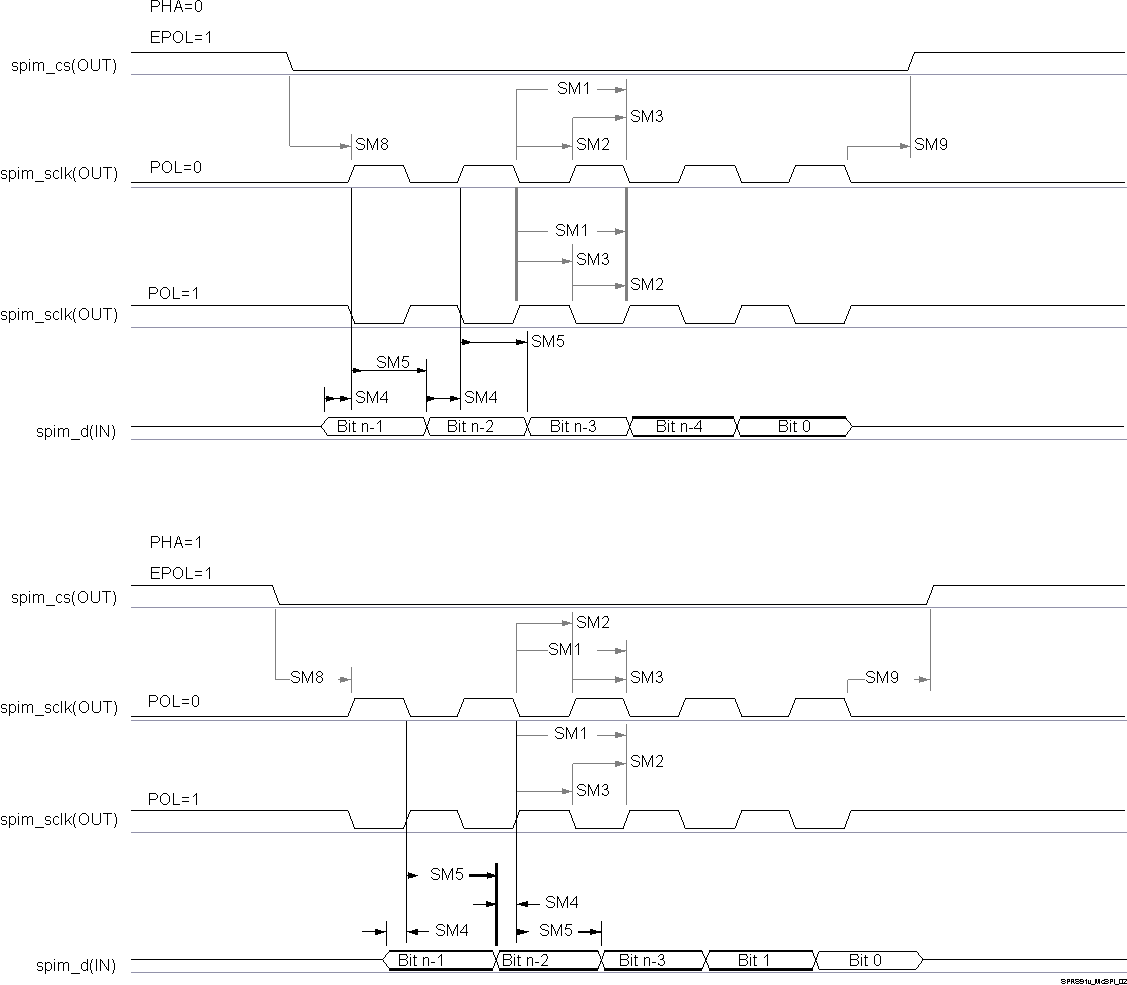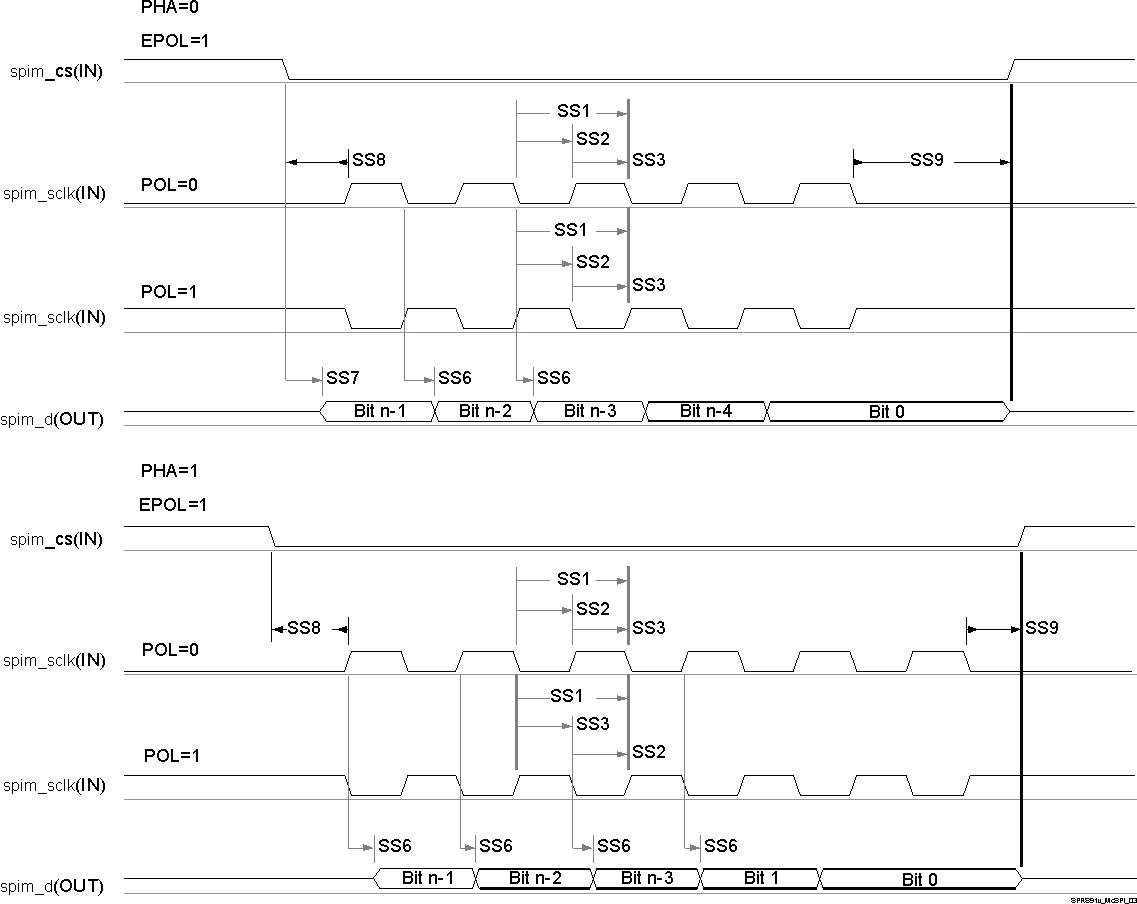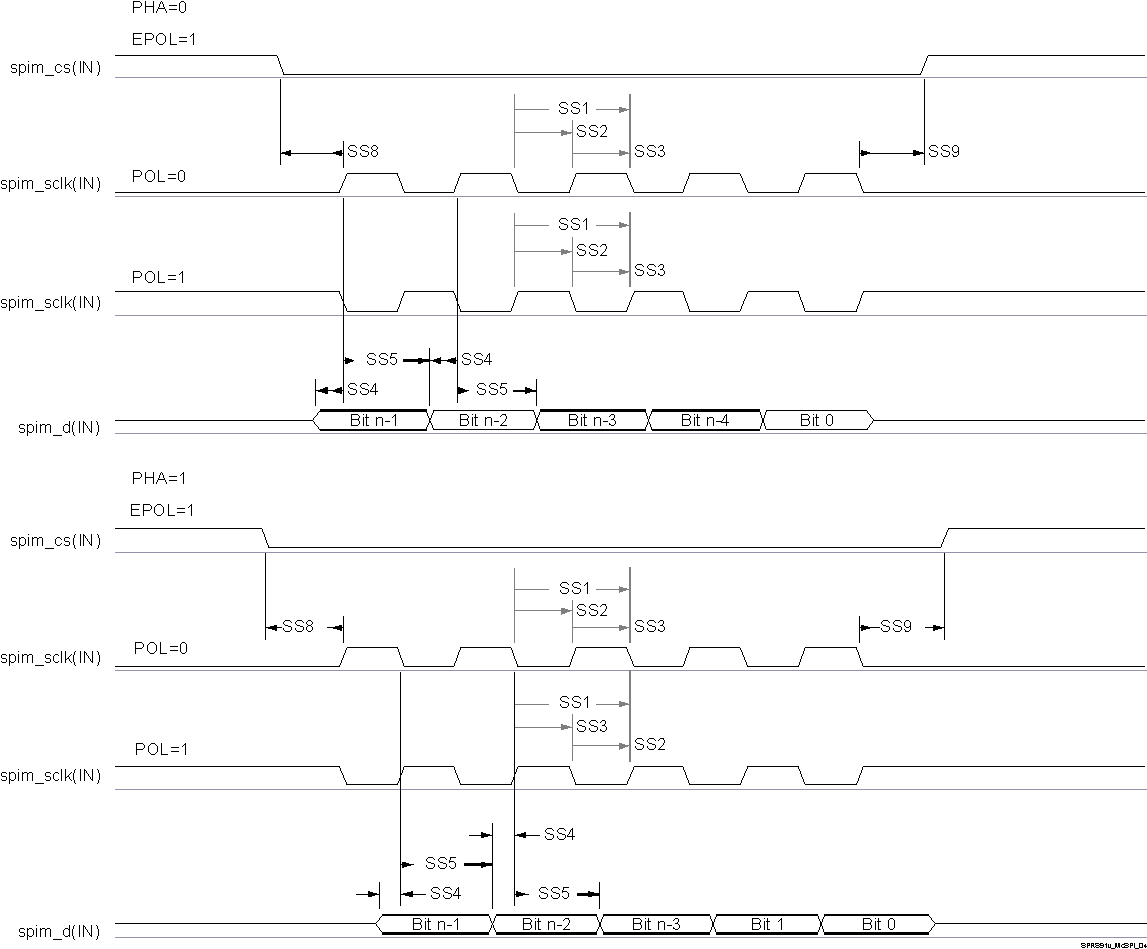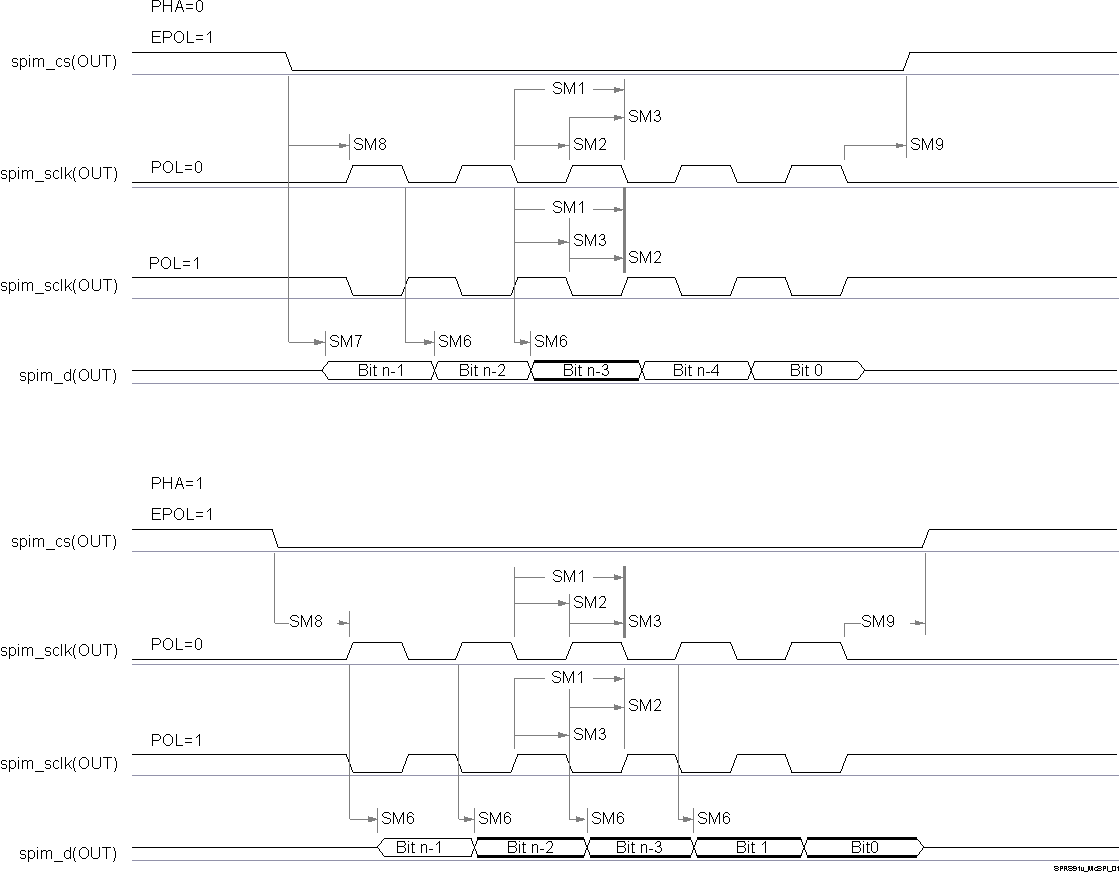SPRS975H August 2016 – February 2020 DRA780 , DRA781 , DRA782 , DRA783 , DRA785 , DRA786 , DRA787 , DRA788
PRODUCTION DATA.
- 1Device Overview
- 2Revision History
- 3Device Comparison
-
4Terminal Configuration and Functions
- 4.1 Pin Diagram
- 4.2 Pin Attributes
- 4.3
Signal Descriptions
- 4.3.1 VIP
- 4.3.2 DSS
- 4.3.3 SD_DAC
- 4.3.4 ADC
- 4.3.5 Camera Control
- 4.3.6 CPI
- 4.3.7 CSI2
- 4.3.8 EMIF
- 4.3.9 GPMC
- 4.3.10 Timers
- 4.3.11 I2C
- 4.3.12 UART
- 4.3.13 McSPI
- 4.3.14 QSPI
- 4.3.15 McASP
- 4.3.16 DCAN and MCAN
- 4.3.17 GMAC_SW
- 4.3.18 SDIO Controller
- 4.3.19 GPIO
- 4.3.20 PWMSS
- 4.3.21 ATL
- 4.3.22 Test Interfaces
- 4.3.23 System and Miscellaneous
- 4.3.24 Power Supplies
- 4.4 Pin Multiplexing
- 4.5 Connections for Unused Pins
-
5Specifications
- 5.1 Absolute Maximum Ratings
- 5.2 ESD Ratings
- 5.3 Power-On Hours (POH)
- 5.4 Recommended Operating Conditions
- 5.5 Operating Performance Points
- 5.6 Power Consumption Summary
- 5.7
Electrical Characteristics
- Table 5-6 LVCMOS DDR DC Electrical Characteristics
- Table 5-7 Dual Voltage LVCMOS I2C DC Electrical Characteristics
- Table 5-8 IQ1833 Buffers DC Electrical Characteristics
- Table 5-9 IHHV1833 Buffers DC Electrical Characteristics
- Table 5-10 LVCMOS Analog OSC Buffers DC Electrical Characteristics
- Table 5-11 Dual Voltage LVCMOS DC Electrical Characteristics
- Table 5-12 Analog-to-Digital ADC Subsystem Electrical Specifications
- 5.8 Thermal Characteristics
- 5.9
Timing Requirements and Switching Characteristics
- 5.9.1 Timing Parameters and Information
- 5.9.2 Interface Clock Specifications
- 5.9.3 Power Supply Sequences
- 5.9.4 Clock Specifications
- 5.9.5 Recommended Clock and Control Signal Transition Behavior
- 5.9.6
Peripherals
- 5.9.6.1 Timing Test Conditions
- 5.9.6.2 VIP
- 5.9.6.3 DSS
- 5.9.6.4 EMIF
- 5.9.6.5 GPMC
- 5.9.6.6 GP Timers
- 5.9.6.7 I2C
- 5.9.6.8 UART
- 5.9.6.9 McSPI
- 5.9.6.10 QSPI
- 5.9.6.11
McASP
- Table 5-50 Timing Requirements for McASP1
- Table 5-51 Timing Requirements for McASP2
- Table 5-52 Timing Requirements for McASP3
- Table 5-53 Switching Characteristics Over Recommended Operating Conditions for McASP1
- Table 5-54 Switching Characteristics Over Recommended Operating Conditions for McASP2
- Table 5-55 Switching Characteristics Over Recommended Operating Conditions for McASP3
- 5.9.6.12 DCAN and MCAN
- 5.9.6.13
GMAC_SW
- 5.9.6.13.1 GMAC MDIO Interface Timings
- 5.9.6.13.2
GMAC RGMII Timings
- Table 5-63 Timing Requirements for rgmiin_rxc - RGMIIn Operation
- Table 5-64 Timing Requirements for GMAC RGMIIn Input Receive for 10/100/1000 Mbps
- Table 5-65 Switching Characteristics Over Recommended Operating Conditions for rgmiin_txctl - RGMIIn Operation for 10/100/1000 Mbit/s
- Table 5-66 Switching Characteristics for GMAC RGMIIn Output Transmit for 10/100/1000 Mbps
- 5.9.6.14 SDIO Controller
- 5.9.6.15 GPIO
- 5.9.6.16 ATL
- 5.9.7
Emulation and Debug Subsystem
- 5.9.7.1
JTAG Electrical Data/Timing
- Table 5-78 Timing Requirements for IEEE 1149.1 JTAG
- Table 5-79 Switching Characteristics Over Recommended Operating Conditions for IEEE 1149.1 JTAG
- Table 5-80 Timing Requirements for IEEE 1149.1 JTAG With RTCK
- Table 5-81 Switching Characteristics Over Recommended Operating Conditions for IEEE 1149.1 JTAG With RTCK
- 5.9.7.2 Trace Port Interface Unit (TPIU)
- 5.9.7.1
JTAG Electrical Data/Timing
-
6Detailed Description
- 6.1 Overview
- 6.2 Processor Subsystems
- 6.3 Accelerators and Coprocessors
- 6.4
Other Subsystems
- 6.4.1 Memory Subsystem
- 6.4.2 Interprocessor Communication
- 6.4.3 Interrupt Controller
- 6.4.4 EDMA
- 6.4.5 Peripherals
- 6.4.6 On-Chip Debug
-
7Applications, Implementation, and Layout
- 7.1 Introduction
- 7.2 Power Optimizations
- 7.3 Core Power Domains
- 7.4 Single-Ended Interfaces
- 7.5 Differential Interfaces
- 7.6 Clock Routing Guidelines
- 7.7 DDR2 Board Design and Layout Guidelines
- 7.8
DDR3 Board Design and Layout Guidelines
- 7.8.1 DDR3 General Board Layout Guidelines
- 7.8.2
DDR3 Board Design and Layout Guidelines
- 7.8.2.1 Board Designs
- 7.8.2.2 DDR3 Device Combinations
- 7.8.2.3 DDR3 Interface Schematic
- 7.8.2.4 Compatible JEDEC DDR3 Devices
- 7.8.2.5 PCB Stackup
- 7.8.2.6 Placement
- 7.8.2.7 DDR3 Keepout Region
- 7.8.2.8 Bulk Bypass Capacitors
- 7.8.2.9 High Speed Bypass Capacitors
- 7.8.2.10 Net Classes
- 7.8.2.11 DDR3 Signal Termination
- 7.8.2.12 VTT
- 7.8.2.13 CK and ADDR_CTRL Topologies and Routing Definition
- 7.8.2.14 Data Topologies and Routing Definition
- 7.8.2.15 Routing Specification
- 7.9 CVIDEO/SD-DAC Guidelines and Electrical Data/Timing
- 8Device and Documentation Support
- 9Mechanical, Packaging, and Orderable Information
Package Options
Refer to the PDF data sheet for device specific package drawings
Mechanical Data (Package|Pins)
- ABF|367
Thermal pad, mechanical data (Package|Pins)
Orderable Information
5.9.6.9 McSPI
The McSPI is a master/slave synchronous serial bus. There are four separate McSPI modules (SPI1, SPI2, SPI3, and SPI4) in the device. All these four modules support up to four external devices (four chip selects) and are able to work as both master and slave.
The McSPI modules include the following main features:
- Serial clock with programmable frequency, polarity, and phase for each channel
- Wide selection of SPI word lengths, ranging from 4 to 32 bits
- Up to four master channels, or single channel in slave mode
- Master multichannel mode:
- Full duplex/half duplex
- Transmit-only/receive-only/transmit-and-receive modes
- Flexible input/output (I/O) port controls per channel
- Programmable clock granularity
- SPI configuration per channel. This means, clock definition, polarity enabling and word width
- Power management through wake-up capabilities
- Programmable timing control between chip select and external clock generation
- Built-in FIFO available for a single channel.
- Each SPI module supports multiple chip select pins spim_cs[i], where i = 1 to 4.
NOTE
For more information, see the Serial Communication Interface section of the device TRM.
NOTE
The McSPIm module (m = 1 to 4) is also referred to as SPIm.
Table 5-44, Figure 5-41 and Figure 5-42 present Timing Requirements for McSPI - Master Mode.
Table 5-44 Timing Requirements for SPI - Master Mode
| NO. | PARAMETER | DESCRIPTION | MODE | MIN | MAX | UNIT |
|---|---|---|---|---|---|---|
| SM1 | tc(SPICLK) | Cycle time, spi_sclk (1)(2) | SPI1/2/3/4 | 20.8 | ns | |
| SM2 | tw(SPICLKL) | Typical Pulse duration, spi_sclk low (1) | 0.5×P-1 (3) | ns | ||
| SM3 | tw(SPICLKH) | Typical Pulse duration, spi_sclk high (1) | 0.5×P-1 (3) | ns | ||
| SM4 | tsu(MISO-SPICLK) | Setup time, spi_d[x] valid before spi_sclk active edge (1) | 2.29 | ns | ||
| SM5 | th(SPICLK-MISO) | Hold time, spi_d[x] valid after spi_sclk active edge (1) | 2.67 | ns | ||
| SM6 | td(SPICLK-SIMO) | Delay time, spi_sclk active edge to spi_d[x] transition (1) | SPI1/2/4 | -3.57 | 3.57 | ns |
| SPI3 | -3.57 | 3.57 | ns | |||
| SM7 | td(CS-SIMO) | Delay time, spi_cs[x] active edge to spi_d[x] transition | 3.57 | ns | ||
| SM8 | td(CS-SPICLK) | Delay time, spi_cs[x] active to spi_sclk first edge (1) | MASTER_PHA0 (4) | B-4.2 (5) | ns | |
| MASTER_PHA1 (4) | A-4.2 (6) | ns | ||||
| SM9 | td(SPICLK-CS) | Delay time, spi_sclk last edge to spi_cs[x] inactive (1) | MASTER_PHA0 (4) | A-4.2 (6) | ns | |
| MASTER_PHA1 (4) | B-4.2 (5) | ns |
- This timing applies to all configurations regardless of SPI_CLK polarity and which clock edges are used to drive output data and capture input data.
- Related to the SPI_CLK maximum frequency.
- P = SPICLK period.
- SPI_CLK phase is programmable with the PHA bit of the SPI_CH(i)CONF register.
- B = (TCS + 0.5) × TSPICLKREF × Fratio, where TCS is a bit field of the SPI_CH(i)CONF register and Fratio = Even ≥2.
- When P = 20.8 ns, A = (TCS + 1) × TSPICLKREF, where TCS is a bit field of the SPI_CH(i)CONF register. When P > 20.8 ns, A = (TCS + 0.5) × Fratio × TSPICLKREF, where TCS is a bit field of the SPI_CH(i)CONF register.
- The IO timings provided in this section are applicable for all combinations of signals for spi1 and spi2. However, the timings are only valid for spi3 and spi4 if signals within a single IOSET are used. The IOSETs are defined in the following tables.
 Figure 5-42 McSPI - Master Mode Receive
Figure 5-42 McSPI - Master Mode Receive Table 5-45, Figure 5-43 and Figure 5-44 present Timing Requirements for McSPI - Slave Mode.
Table 5-45 Timing Requirements for SPI - Slave Mode(5)
| NO. | PARAMETER | DESCRIPTION | MODE | MIN | MAX | UNIT |
|---|---|---|---|---|---|---|
| SS1 (1)(2) | tc(SPICLK) | Cycle time, spi_sclk | SPI1 | 25 | ns | |
| SPI2/3/4 | 33.3 | ns | ||||
| SS2 (1) | tw(SPICLKL)(3) | Typical Pulse duration, spi_sclk low | 0.45×P | ns | ||
| SS3 (1) | tw(SPICLKH)(3) | Typical Pulse duration, spi_sclk high | 0.45×P | ns | ||
| SS4 (1) | tsu(SIMO-SPICLK) | Setup time, spi_d[x] valid before spi_sclk active edge | 2.82 | ns | ||
| SS5 (1) | th(SPICLK-SIMO) | Hold time, spi_d[x] valid after spi_sclk active edge | 2.82 | ns | ||
| SS6 (1) | td(SPICLK-SOMI) | Delay time, spi_sclk active edge to mcspi_somi transition | SPI1 | 2 | 9.8 | ns |
| SPI2/3/4 | 2 | 21 | ns | |||
| SS7 (4) | td(CS-SOMI) | Delay time, spi_cs[x] active edge to mcspi_somi transition | 16 | ns | ||
| SS8 (1) | tsu(CS-SPICLK) | Setup time, spi_cs[x] valid before spi_sclk first edge | 2.82 | ns | ||
| SS9 (1) | th(SPICLK-CS) | Hold time, spi_cs[x] valid after spi_sclk last edge | 2.82 | ns |
- This timing applies to all configurations regardless of SPI_CLK polarity and which clock edges are used to drive output data and capture input data.
- When operating the SPI interface in RX-only mode, the minimum Cycle time is 26ns (38.4MHz)
- P = SPICLK period.
- PHA = 0; SPI_CLK phase is programmable with the PHA bit of the SPI_CH(i)CONF register.
- The IO timings provided in this section are applicable for all combinations of signals for spi1 and spi2. However, the timings are only valid for spi3 and spi4 if signals within a single IOSET are used. The IOSETs are defined in the following tables.
 Figure 5-43 McSPI - Slave Mode Transmit
Figure 5-43 McSPI - Slave Mode Transmit  Figure 5-44 McSPI - Slave Mode Receive
Figure 5-44 McSPI - Slave Mode Receive CAUTION
The IO timings provided in this section are applicable for all combinations of signals for SPI2 and SPI4. However, the timings are only valid for SPI1 and SPI3 if signals within a single IOSET are used. The IOSETs are defined in Table 5-46.
In Table 5-46 are presented the specific groupings of signals (IOSET) for use with McSPI.
Table 5-46 McSPI1/3 IOSETs
| SIGNALS | IOSET1 | IOSET2 | IOSET3 | |||
|---|---|---|---|---|---|---|
| BALL | MUX | BALL | MUX | BALL | MUX | |
| SPI1 | ||||||
| spi1_sclk | M2 | 0 | M2 | 0 | M2 | 0 |
| spi1_d1 | U6 | 0 | U6 | 0 | U6 | 0 |
| spi1_d0 | T5 | 0 | T5 | 0 | T5 | 0 |
| spi1_cs0 | R6 | 0 | R6 | 0 | R6 | 0 |
| spi1_cs1 | R5 | 0 | ||||
| spi1_cs2 | F14 | 5 | ||||
| spi1_cs3 | C14 | 5 | ||||
| SPI3 | ||||||
| spi3_sclk | F15 | 4 | C6 | 4 | ||
| spi3_d1 | D14 | 4 | F7 | 4 | ||
| spi3_d0 | D15 | 4 | E7 | 4 | ||
| spi3_cs0 | F16 | 4 | B6 | 4 | ||
